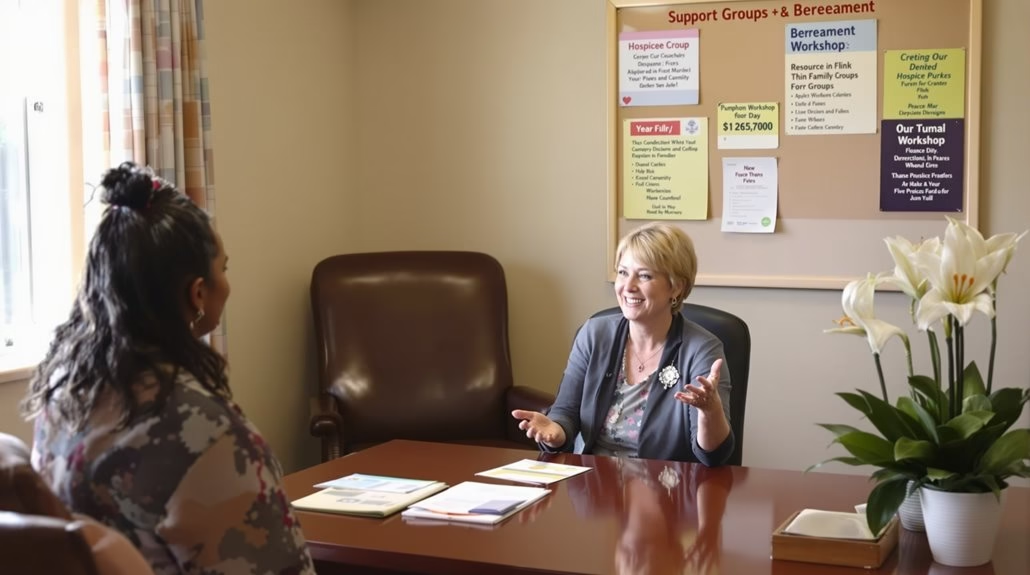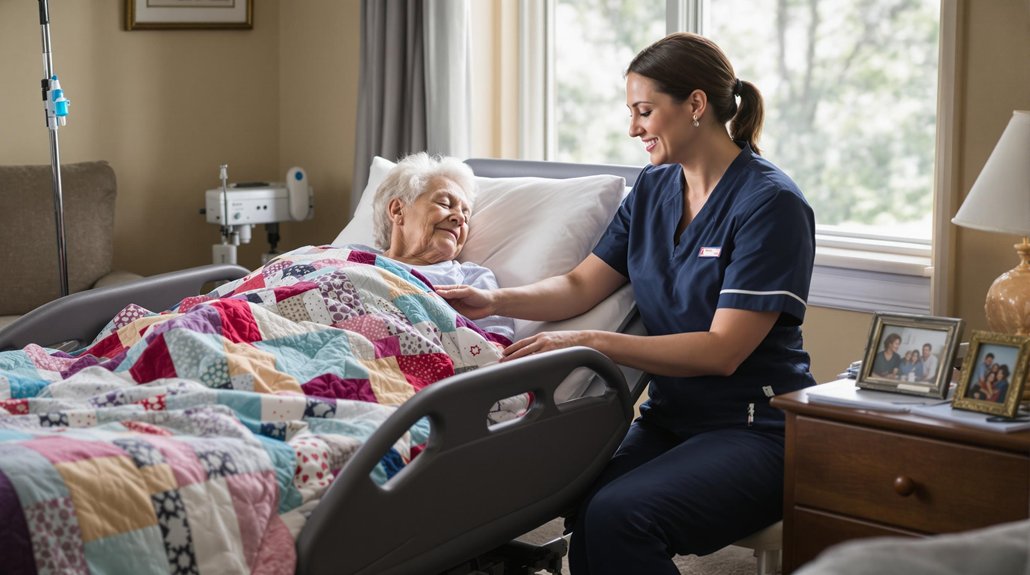Being a hospice caregiver can challenge you emotionally, physically, and mentally in ways you’ve never experienced before. You’ll face moments of profound sadness alongside instances of deep connection and meaning. While the journey may feel overwhelming at times, there are proven strategies that can help you navigate this important role with greater confidence and resilience. Let’s explore the essential approaches that successful caregivers use to maintain their well-being while providing compassionate care.
Key Takeaways
- Build a comprehensive support network including family, friends, and professional counselors to share caregiving responsibilities and emotional burdens.
- Maintain consistent self-care routines with regular meals, sleep schedules, and personal time to prevent caregiver burnout.
- Acknowledge and express emotions through support groups or counseling rather than suppressing feelings of grief, anxiety, or sadness.
- Establish a structured daily schedule that balances caregiving duties with personal needs and necessary breaks.
- Utilize professional bereavement resources and respite care services to manage stress and receive guidance throughout the caregiving journey.
Recognizing and Managing Caregiver Emotions

While caring for someone in hospice can be deeply meaningful, it often brings intense emotional challenges that shouldn’t be ignored. You may experience waves of sadness, guilt, or anxiety as you navigate this demanding role. Instead of suppressing these feelings, acknowledge them as natural responses to a difficult situation.
Don’t hesitate to reach out for support before you’re overwhelmed. Connect with friends, family, or join a hospice support group where you can share your experiences.
Professional counselors can provide valuable strategies for managing your emotions while maintaining the strength to care for your loved one effectively. Grief counseling services are available through hospice care programs to help caregivers cope with emotional overwhelm while providing end-of-life care.
Building a Strong Support Network
Taking care of a hospice patient shouldn’t be a solo journey.
You’ll need a reliable network of support to help you navigate this challenging time. Start by reaching out to family members and close friends who can share caregiving responsibilities and provide emotional support.
Don’t hesitate to join hospice support groups where you can connect with others facing similar experiences.
These groups offer valuable coping strategies and understanding that only fellow caregivers can provide.
Additionally, consider working with a professional grief counselor who can help you develop personalized techniques for managing stress and emotions during this difficult period.
Respite care options can help prevent caregiver burnout while ensuring your loved one continues receiving quality care.
Maintaining Daily Wellness Routines

As you navigate the demands of hospice caregiving, maintaining your own wellness routine becomes essential for sustained energy and emotional balance.
Prioritize regular meals, even if they’re simple, and stick to consistent sleep schedules whenever possible. Don’t neglect basic self-care activities like showering, exercise, or pursuing hobbies that bring you joy.
Create a daily schedule that includes dedicated time for your physical and emotional needs. You’ll be better equipped to care for your loved one when you’re taking care of yourself.
Consider sharing caregiving responsibilities with family members or respite care services to prevent burnout and maintain your health.
Compassionate respite care offers professional support and temporary relief to help prevent caregiver burnout while ensuring your loved one receives quality care.
Understanding the Stages of Grief
Self-care routines help prepare you for the emotional journey ahead, which includes understanding how grief manifests throughout the hospice experience.
You’ll likely encounter anticipatory grief before your loved one’s passing, experiencing feelings of sadness, anxiety, and loneliness.
Don’t try to suppress these emotions – they’re natural responses to loss. Instead, share your feelings with family members or join a support group where others understand your situation.
Remember that grief affects everyone differently, and there’s no “right” way to process it.
Professional counselors can help you develop coping strategies and guide you through this challenging time while maintaining your emotional well-being.
Accessing Professional Bereavement Resources

While traversing the hospice journey, you’ll find professional bereavement resources essential for maintaining emotional stability and processing grief effectively.
Connect with trained grief counselors who can provide personalized strategies and coping mechanisms tailored to your situation. These professionals offer one-on-one support for up to 12 months after loss.
Don’t hesitate to join hospice support groups where you can share experiences with others facing similar challenges.
Through these resources, you’ll gain valuable insights, learn practical techniques for managing emotions, and receive guidance on maneuvering complex care responsibilities.
Conclusion
Remember, you’re not alone in your hospice caregiving journey. When you’re feeling overwhelmed, reach out to your support network and take advantage of professional resources. Don’t neglect your own well-being – maintain healthy routines and acknowledge your emotions throughout the process. By implementing these essential strategies and accessing available support, you’ll be better equipped to provide compassionate care while protecting your emotional health.





